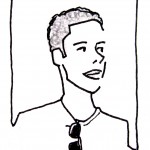I write these columns to remind myself that certain things are true. When the columns are good, they remind other people of the true thing, too, a sort of collective remembering, but at their heart is a simpler goal: to put feelings to words so they will keep. Now that I don’t have many words left — these 700 are my last — I find myself considering all the columns I didn’t write.
 I didn’t write about the times I felt my soul being wrung in my chest when I wondered: What is the point? There have been columns about the highs that counterbalanced these lows — about the moments I felt so happy I wished time would slow its pace — but I never wrote about the days when my limbs grew so heavy that I struggled to get them out of bed.
I didn’t write about the times I felt my soul being wrung in my chest when I wondered: What is the point? There have been columns about the highs that counterbalanced these lows — about the moments I felt so happy I wished time would slow its pace — but I never wrote about the days when my limbs grew so heavy that I struggled to get them out of bed.
I didn’t write about the white flowers that blossom on the tree by Byers in the Silliman courtyard. Now they are wilted, but a few weeks ago, on a late afternoon when the sun was orange, the light filtered through the petals so each flower became a tiny lantern. When the wind blew, the petals fluttered — a hundred thousand wings on the verge of flight.
I didn’t write about the heat that comes in August, in the weeks after move-in. In the first days of the year, humidity makes composure impossible, so people become vulnerable in a good way. The nights of late August are to be spent together, under the starless New Haven sky, lying in hammocks or sitting on rooftops or ledges.
These things — the sadness, the flowers, the thick August nights — were true. I saw them, touched them, felt them. The columns about these things went unwritten because of scarce resources — hours in my days and space on the opinion page — but also because they are complicated: ephemeral, intangible. Good columns have straightforward narratives for which these subjects are ill-suited. They are details that are hard to fold into the stories I tell myself about Yale. Under the right light, the tree in the Silliman courtyard can give you pause, but its flowers are improbable subjects for a 700-word opinion piece.
Still, I’m afraid of forgetting. The present exists with a depth of color that doesn’t keep. “The sound of anything coming at you — a train, say, or the future — has a higher pitch than the sound of the same thing going away,” Wallace Stegner wrote in Angle of Repose. In this version of the Doppler Effect, the “thing going away” is memory, lower in frequency and muted, faded. Memories carry implicit narratives that flatten the details for ease of storage. I wonder if I’ll look back on my college years when I’m wizened and remember the petals caught in the orange sunlight.
I hope so. It’s through these details I feel most alive. To be human is to experience life at its extremes of sadness, of beauty and of happiness. The lows, the highs, the fluttering flowers and the headiness of late summer: They elude the narrative of memory precisely because they are too vibrant.
For example: Last Tuesday, like most Tuesdays this year, I went with some friends to a bar on Temple Street for trivia night and five-dollar pitchers of Miller Light. We weren’t expecting to win — we hadn’t even broken third the past twenty-something tries — but we went into the last round only 15 points behind the leader. At the end, as the announcer read the scores, we held hands in a circle, and when he called our name in first, we leapt off our seats. We cheered and thumped the table and spilled our beer, but we were too giddy to care (and, anyway, the money we won bought us another four rounds).
At that moment, at the bar, I felt a happiness that was too big for my chest. My response was probably disproportionate to the feat — this was trivia, not a national championship — but it was real. And despite the vibrancy of the moment, the details have already begun to flatten. I forget the questions asked and the music played and the anticipation I felt as the scores were read. But I’m doing my best to hold on: I write this column to remind myself it was true.
Teo Soares is a senior in Silliman College. This is his last column for the News. Contact him at teo.soares@yale.edu .







